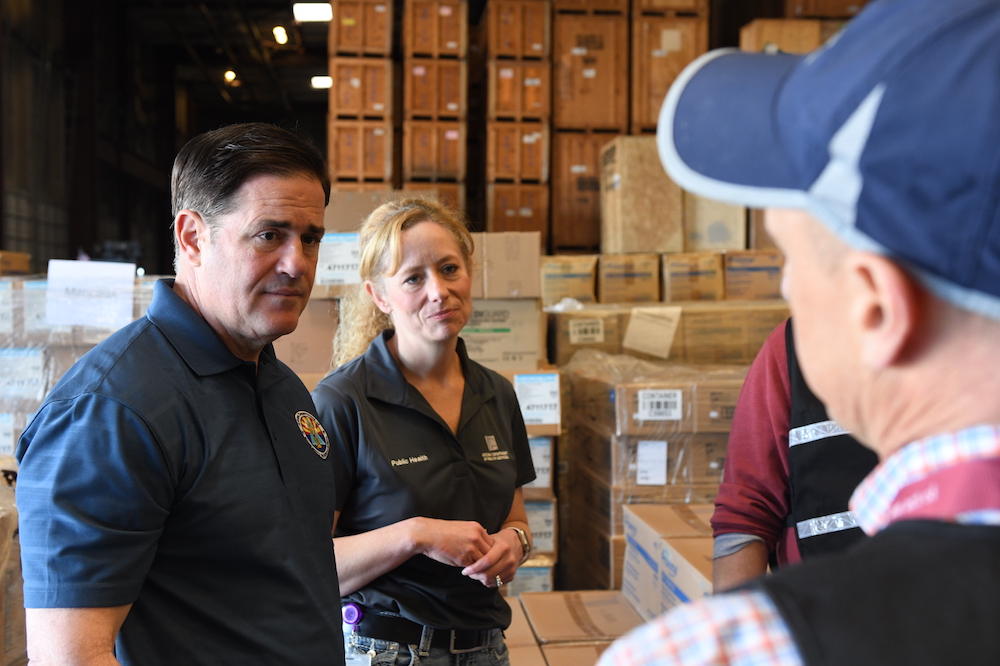Ducey issues executive order to accelerate tracking of COVID-19
Governor Doug Ducey today issued an executive order implementing an Enhanced Surveillance Advisory that will accelerate tracking of COVID-19 cases and strengthen the ability of the Arizona Department of Health Services (ADHS) to respond to the outbreak. The advisory requires hospitals and testing laboratories to report key metrics that will inform the state’s response to COVID-19.
“Protecting public health and ensuring the safety of our communities is job number one for Arizona,” said Governor Ducey. “We are taking proactive action to ensure the public health professionals at the Arizona Department of Health Services have the tools and information they need to combat the spread of COVID-19. Working with healthcare providers and our local partners across the state, this advisory will expand our capability to respond and keep Arizonans safe.”
“My team and I are committed to doing everything we can to fight the spread of COVID-19,” said Dr. Cara Christ, Director of the Arizona Department of Health Services. “The enhanced surveillance for COVID-19 information will improve our awareness of our hospital and surge capacity, allow us to get denominator data on commercial laboratory testing and collect laboratory specimens to do further analysis and sequencing.”
To better prepare for and respond to the spread of COVID-19, the advisory requires hospitals in Arizona to report daily statistics on staff resources, ventilator availability, intensive care unit (ICU) bed availability, inpatient bed availability, personal protective equipment (PPE) supply levels, medical supply levels as well as describe their current triage process.
The advisory also requires laboratories to report the results of all COVID-19 tests or a weekly aggregate number of total COVID-19 tests performed. In addition, it directs enhanced patient tracking, information sharing and coordination of specimen testing. The order follows Governor Ducey’s declaration of a Public Health Emergency on March 11.
ADHS and local health authorities will be empowered to access confidential patient information, including medical records, to identify, diagnose, treat and track persons who may have been exposed. To protect the privacy of patients, any identifying information received from the advisory is confidential.
To coordinate additional testing for COVID-19, the advisory will also allow ADHS to designate other laboratories to assist it in testing specimens if necessary and at state expense. If requested by ADHS or local health authorities, public safety agencies may be requested to coordinate transportation of samples to laboratories for testing.
To view the Enhanced Surveillance Advisory, click HERE.
Ducey issues executive order detailing ‘essential services’
|
Governor Doug Ducey today issued an executive order clarifying businesses and operations deemed “essential” by the state and providing certainty to business owners, employees and families. The order is a proactive and administrative measure to ensure consistent guidance across the state. “Arizona is focused on limiting the spread of COVID-19, while providing relief to families, individuals and businesses impacted,” said Governor Ducey. “This proactive order will ensure the state has one consistent, overarching policy that is based on CDC and public health guidance — allowing business owners and workers to responsibly plan ahead. We will continue to proceed with a calm and steady approach and act with urgency, while providing certainty whenever possible.” The executive order outlines “essential services” to include: • Health care and public health operations, including hospitals, public health entities, distributors of personal protective equipment and biotechnology companies; • Human services operations, including those that provide services for the elderly, those with developmental disabilities, foster and adoption children and the homeless; • Infrastructure operations, including food production, utility operators, construction and internet providers; • Government functions, including first responders, emergency management personnel, 911 operators, child protection staff, welfare providers and more; • Business operations, including grocery and medicine providers, outdoor recreation; • Organizations that provide charitable and social services, including religious and secular non-profit organizations and food banks; • Media organizations, including newspaper, television, radio and other media services; • Gas stations and other transportation-related businesses; • Financial institutions, including banks and credit unions; • Hardware and supply stores; • Critical trades, including plumbers, electricians, cleaning, sanitation, HVAC and security staff; • Mail, post, shipping and logistics; • Education institutions, including public and private K-12 schools, universities and research entities; • Laundry services; • Restaurants for consumption off-premises; • Supplies distributors that enable telework and work from home and those that supply essential businesses; • Transportation, including airlines, taxis, and ride-sharing; • Home-based and care services, including for seniors and those with developmental disabilities; • Residential facilities and shelters, including those for children, seniors or at-risk populations; • Professional services, including legal, real estate and accounting services; • Day care centers for employees exempted though the order; • Manufacturers, distribution and producers of supply chain-critical products; • Hotels and motels; • And funeral services. The order allows individuals and entities to utilize teleworking to complete essential services. View the executive order HERE. |




